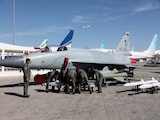At the iconic Pushkar Fair of Rajasthan, where buffaloes and horses are valued at over a crore of rupees, the "ship of the desert," the camel, is struggling to stay afloat in a shrinking market.
Even as the fair dazzles with stars like Balveer, Badal, Nagina, and Shehzadi commanding record prices, camels are fetching a modest Rs 10,000 to Rs 1 lakh, with their owners still grappling with red tape and transport restrictions.
The Crorepati Buffalo Of Pushkar
Balveer, a Murrah buffalo from Rajasthan's Didwana, is one of the biggest attractions this year. At just 35 months old, the jet-black buffalo weighs 800 kilos, stands 5 feet 8 inches tall, and is valued at Rs 1 crore.
His owner, Dungaram, beams as he talks about his champion. "Balveer won the first prize in the buffalo category competition because of his shining coat and strength. We feed him ghee, milk, green fodder, and khal or protein cake, a special animal fodder," he says.
Balveer, who is mainly used for breeding, earns around Rs 80,000 a month. "The Murrah breed is known for its sturdy structure and shining coat. It also produces good-quality milk. Balveer's mother used to produce 22 litres of milk, and his ancestry is from Bhattu Kalan in Haryana," says Dungaram.
He explains the genetics behind Balveer's value. "In buffaloes, how much milk they will give depends on their genetics and body structure. Feeding them more won't increase yield. So Balveer will produce offspring with high milk production."
Dungaram adds, "Once Balveer grows up, his semen will fetch more money. Right now, it's collected twice a month and fetches up to Rs 80,000 since he is under three years old. Once he crosses four, it will double or treble. Maintaining him costs about Rs 35,000 per month. I don't want to sell him, but if someone offers Rs 1 crore, I may consider it."
Star Horses Steal The Show
The other star of the Pushkar Fair is Badal, a horse from Ajmer's Kekdi. The majestic horse from Kekri in Ajmer has become a social media sensation for his height and regal appearance. Badal has reportedly been offered a Bollywood film role for Rs 15 lakh, a deal his owner Rahul says is confirmed. "Ten lakh rupees have already been paid in advance, and the remaining Rs 5 lakh will be paid after the month-long shoot," Rahul says proudly.
A white mare named Shehzadi is also stealing hearts at the fair. Known for her graceful dance steps and gleaming white coat, she carries a price tag of Rs 51 lakh. Meanwhile, Nagina, a striking mare from Punjab valued at over Rs 1 crore, arrived in style, travelling to Pushkar in her own air-conditioned horse float.
Camels Struggle Despite Ban Lift
But even amid the glamour, the camel, the mainstay of Rajasthan's desert economy, faces an uncertain trade. With prices starting at Rs 5,000 and rarely crossing Rs 1 lakh, camel owners were hopeful this year after the government lifted the ban on transporting camels outside Rajasthan.
The ban, imposed during the Vasundhara Raje government, came after camel populations in the state plummeted to just two lakh, as per the 2019 livestock census. Though the restriction has now been eased, bureaucratic hurdles remain, buyers still need an SDM permit, a veterinary health certificate, and a statement on the purpose of transport before moving the animals out of the fair or the state.
Hanuwant Singh, secretary of the Lok Pashu Palak Samiti, an NGO working to preserve camels, says the situation remains grim. "The number of camels has dipped alarmingly in Rajasthan. According to our estimates, there are only about 1.5 lakh camels left. Around 5,000 camels have come for trade this year, but despite the lifting of the ban, buyers are still finding it difficult to transport the animals," he said.
"The camels this year are fetching Rs 20,000 to Rs 1 lakh. Last year, due to the ban, they were selling as low as Rs 1,500. But camel owners are again disheartened. Many buyers from UP and Bihar are unable to take the animals home because the transport norms haven't been simplified. There's also concern that male camels could be taken for slaughter, so the government needs to stay vigilant," Singh added.
Vigilante Trouble On Highway
On Wednesday, cow vigilante groups in Behror, along the Delhi highway, stopped a vehicle transporting eight camels bought at the Pushkar Fair and allegedly headed to Firozpur on the Haryana-UP border. The driver, Jahid from Baghpat in Haryana, was beaten up on suspicion of taking the camels for slaughter.
He was later arrested for cruelty to animals, and the camels were seized. Police said the matter is under investigation.
Officials from the Animal Husbandry Department clarified that while the transportation ban has been lifted, "permits will still be issued only after obtaining a health certificate and a statement on the purpose of transport from the relevant authority at the Pushkar fair."
Hope For Better Prices
For some, however, the fair brought modest relief. "I sold my male camel Moti, who is 4 years old, for Rs 35,000. It was a good price. Earlier, camels never commanded this kind of value," said Kishnaji, a camel owner from Chandawal village in Pali district.
Still, uncertainty hangs heavy over the desert fair. If transportation restrictions remain complicated, the fragile recovery in camel prices may not last.















